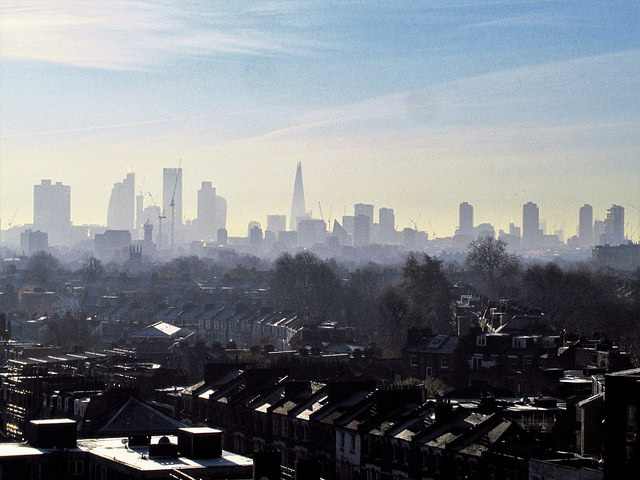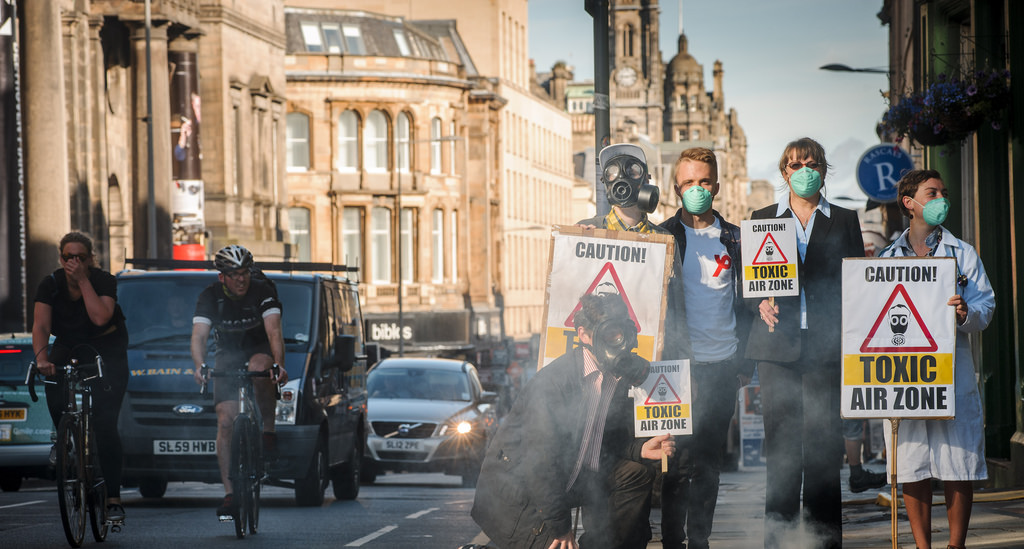The government has launched its flagship Clean Air Strategy which includes plans to restrict wood burners, open fires and agricultural use of ammonia as it pledges to clean up air pollution and ‘save lives’.
Environment Secretary Michael Gove’s plans focus on reducing exposure to particulate matter to meet air quality targets outlined by the World Health Organization, (WHO) guidelines which the government says are tougher than EU requirements.
Dirty air is a major public health issue, which the government ranks behind cancer, obesity and heart disease with a 2016 report by the Royal College of Physicians outlining that air pollution claims at least 40,000 lives a year in the UK.
Launching the Clean Air Strategy, Michael Gove said: “The evidence is clear. While air quality has improved significantly in recent years, air pollution continues to shorten lives, harm our children and reduce quality of life.
“We must take strong, urgent action. Our ambitious strategy includes new targets, new powers for local government and confirms that our forthcoming Environment Bill will include new primary legislation on air quality.”
Clean air helps you live longer.
Health Secretary Matt Hancock
Health Secretary Matt Hancock stressed the importance of tackling dirty air describing it as the ‘single greatest environmental threat to human health’.
He said: “Air pollution is a health issue: it harms the health of the nation. For each of us, our health is unavoidably shaped by the environment we live in. Environmental factors determine around 30% of our healthy life expectancy. Air pollution poses the single greatest environmental threat to human health.
“Breathing dirty air is associated with a host of health problems, from asthma to cardiovascular disease and lung cancer, and all too often it is the most vulnerable – children, older people and those from poorer backgrounds – who are hit hardest. In short: clean air helps you live longer.”
‘Ambitious’ Strategy Targets Four Key Areas
 Fertilizer being applied to a corn field Credit: Wikimedia Commons
Fertilizer being applied to a corn field Credit: Wikimedia Commons
Particulate matter is tiny particles of air – 200 times smaller than a grain of sand – that enter the body via the lungs and become lodged in organs and the brain.
A report last year highlighted 40 towns and cities in the UK where levels of particulate matter exceed WHO limits, including Manchester, Liverpool, Swansea, London, Leicester and Leeds.
The Clean Air Strategy aims to reduce particulate matter emissions by 30% by 2020 and 46% by 2030, through focusing on four key areas – transport, domestic emissions, farming and industry.
The single biggest contributor to primary emissions of fine particulate matter is the burning of wood and coal in domestic settings such as open fires and stoves. The strategy seeks to tackle this by stopping the sale of the most polluting fuels and ensure that only clean stoves are available for purchase by 2022.
The government has already pledged to reduce emissions from transport by banning the sale of diesel and conventional petrol vehicles by 2040, although enivornmental campaigners have urged the government to bring forward the ban to 2030. The strategy hopes to address aviation fuel by 2050.
The use of ammonia in agriculture is also being addressed. The Clean Air Strategy highlights that 88% of UK emissions of ammonia is from agriculture and farming, emitted in the storage and spreading of manures and slurries.
The government plans to regulate use of ammonia, as well as gather evidence of its use, in a bid to develop low emission farming.
The strategy also reiterates the government’s commitment to tackling air pollution from industrial processes.
Government Proposals ‘Severely Lacking in Detail’
 Campaigners from Friends of the Earth Scotland gather on Nicolson Street to demand clean air in August 2015 Credit: Friends of the Earth Scotland Flickr
Campaigners from Friends of the Earth Scotland gather on Nicolson Street to demand clean air in August 2015 Credit: Friends of the Earth Scotland Flickr
Campaigners and critics have hastened to add that the strategy doesn’t go far enough. Friends of the Earth said the air pollution plan is ‘severely lacking in detail’ and called on the government to stop road building.
Friends of the Earth air pollution campaigner, Jenny Bates, said: “The government has made a welcome commitment to set an ambitious new target for cleaning up the most dangerous fine particle air pollution, based on World Health Organisation standards. But while the WHO says standards should be reached by 2030, there is no date set in the government’s strategy and the plan is severely lacking in detail on how such a target could be met.
The government must scrap new road building plans which would add to the problem, and phase out petrol and diesel vehicles faster than planned.
Jenny Bates, Friends of The Earth
“The biggest problem with our currently illegal NO2 air pollution is road transport – and cars and other vehicles are also a key source of particle pollution, both from exhausts and also brake and tyre wear. If the government is serious about protecting our health, and the health of the planet, it must scrap new road building plans which would add to the problem, and phase out petrol and diesel vehicles faster than planned.”
The British Heart Foundation, has called on the government to incorporate the WHO limits on clean air into UK law.
British Heart Foundation chief executive, Simon Gillespie said: “We urgently need these guidelines adopted into national law, to accelerate coordinated, bold and ambitious action that will protect people’s heart and circulatory health wherever they live in the UK.”
UK100, a network of local government leaders campaigning for clean energy, also stressed the need for ‘strong new protections in law’ and called for additional funding.
Polly Billington, Director of UK100, said: “Plans in the Clean Air Strategy will fail unless there are strong new protections in law to clean up our air as we leave the EU and sufficient financial support to make the changes a reality.
Local leaders have consistently stated that Clean Air funding committed by Government to tackle air pollution is simply inadequate on three fronts: not enough funding for those local authority areas that Government has identified as having the most severe air quality challenges, insufficient funding available for tackling the wider sources of air pollution and limited financial support for national measures.”
Conservative think tank, Bright Blue described the strategy as ‘inadequate’ and called on the government to allow local councils to introduce a network of clean air zones.
Do we Have a Right to Clean Air?
 Air pollution in London on November 30, 2016 Credit: David Holt Flickr
Air pollution in London on November 30, 2016 Credit: David Holt Flickr
There is no explicit right to clean air or a healthy environment enshrined in UK law.
The UK has signed and ratified the International Covenant on Economic, Social and Cultural Rights, and Article 12 of this treaty stipulates that states must ensure, “the right of everyone to the enjoyment of the highest attainable standard of physical and mental health”.
However, the International Covenant on Economic, Social and Cultural Rights is not incorporated into UK law, which means the courts are unable to enforce this right.
The UK is still bound to comply with its terms under international law, and is held to account by the UN Committee on Economic, Social and Cultural Rights. However, each state is only subject to review once in a five year cycle, and the committees’ ‘Concluding Observations’ reports do not amount to legally binding judgments. They are effectively a set of recommendations which states frequently ignore.
The State Parties to the present Covenant recognise the right of everyone to the enjoyment of the highest attainable standard of physical and mental health.
International Covenant on Economic, Social and Cultural Rights, Article 12
However, in 2014 a landmark ruling in the European Court of Justice forced the UK government to act on cleaning up polluted air, with the Air Quality Directive establishing legal limits for ‘certain pollutants in ambient air.’
It was warned by the European Commission in January 2018, along with five other countries (Germany, France, Italy, Hungary, Romania), that it’s failure to tackle clean air could result in a multimillion euro fine.
In January 2019, the family of a nine year-old girl who died from asthma was given permission to apply for a fresh inquest into her death, after the Attorney General heard new evidence that her death could be linked to unlawful levels of air pollution.
An inquest into the death of Ella Kissi-Debrah that considers the role of air pollution could have a major impact on the state’s responsibility in ensuring its citizens breathe clean air.







